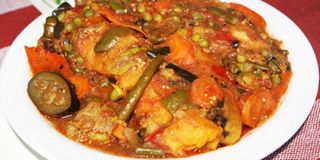UGANDA@50: The king of all Uganda breakfasts

Katogo is a very filling breakfast. photos by Ismail Kezaala
What you need to know:
A combination of variety of ingredients, this dish that would pass for lunch or dinner is one of the most popular option for breakfast. Katogo comes in all forms, more popular with matooke. The meal is said to make your day hunger-free.
The Ugandans call it katogo, while the French call it pot au feu (literally meaning pot on fire), in Spain they would refer to it as “Ollas” while the Mongolian grill is certainly a variation on the theme of katogo though in this case they use a combination of meats mixed with vegetables.
It is a safe bet that if there is one common dish that is universal to Uganda as a Nation, it would be katogo. Originally, conceived as poor man’s dish, it is the quintessence of Ugandan proletariat cuisine and has remained the mainstay for the Ugandan breakfast especially in the Buganda and Western Uganda. The word katogo literally means a ‘mélange’ or mixture of ingredients with one absolute must have; matooke. The process of cooking is done in the manner of braising in other words a combination of stewing and pot roasting.
While no one has an exact chronology as to when Ugandans started cooking katogo, what is not in doubt is that as long as matooke has been around, so has katogo. For that matter, the preparation of steamed matooke is a long and drawn out process that takes up a lot of energy in the form of firewood or charcoal.
Necessity being the mother of invention, a smart person way back in time had the wisdom to realise that boiled matooke takes a short time to cook and though not considered anywhere as near as good as the lovingly steamed and ‘amaniyge’ mashed type, still has the taste and flavour.
My view is that originally the less privileged simply boiled whole matooke “fingers” and added salt and ghee to create a meal that would sustain them during the day. A healthy (minimises the unwanted and dreaded polyunsaturated oils used in frying meats) and practical approach, at the same time the ghee and salt greatly help in bringing out the full flavour of the matooke.
Accidental delicacy
Interestingly, during ancient times when our kings reigned and held court, it was common practice to slaughter all manner of animals the most typical being the cow. In as much as the King had the pick of the roast, one would hardly have expected him to have anything to do with the entrails and so it was left for the hangers on and couturiers to devise the best way of making the most of what the French have come to regard as a delicacy.
The Baganda, being clever and resourceful somehow managed to come up with the excellent combination of offals and matooke. However, today it is a pot pourri, anything goes.
Gone are the days when the hoi polloi could be assured of banking on a thousand bob for a meal of katogo and tea. Still given today’s inflation the price has doubled and even at Shs2,000, with a mug of tea, it continues to be a best seller.
According to Mastula Lubowa, of Just in Time Restaurant located near Christ the King Church, she has several dozen clients from the nearby office blocks who make it a daily habit to eat katogo as breakfast. She charges Shs3, 000 in house while take away would be an extra
Shs1, 000. Lubowa offers only matooke and no Irish potatoes with some meat and a choice of either beans or fresh peas. Moreover, during the month of Ramadan when the Moslem have their annual fast, She alters her katogo and serves during the breaking of the fast to would be dinners and here the price goes up to around.
Shs7,000. Naturally, this is a special occasion and the repast would include Irish potatoes, rice and peas and beef.
N P Baguma and Sons must rank as the most popular place for katogo breakfast and by 7am you can be assured of being served katogo. In this case matooke is the staple with a choice of meat, f for sauce and on any given day katogo is served until 11am when lunch is ready to be served.




